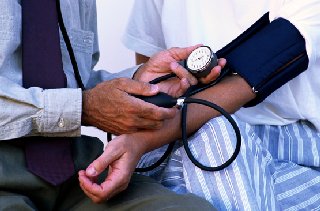Preventing Heart Disease
Blood Pressure
 High blood pressure (140/90 and higher), also called hypertension, is a major risk
factor for heart disease and the most important risk factor for stroke. Elevated blood
pressure makes the heart work overtime. Untreated, high blood pressure can damage the
arteries and the heart itself. High blood pressure can also lead to stroke, heart attack,
eye problems, kidney dysfunction — and even death. In 1994 high blood pressure killed
more than 38,000 Americans.
High blood pressure (140/90 and higher), also called hypertension, is a major risk
factor for heart disease and the most important risk factor for stroke. Elevated blood
pressure makes the heart work overtime. Untreated, high blood pressure can damage the
arteries and the heart itself. High blood pressure can also lead to stroke, heart attack,
eye problems, kidney dysfunction — and even death. In 1994 high blood pressure killed
more than 38,000 Americans.
For example, about 50 million North Americans (one in four) have high blood pressure, yet 35 percent of those people do not even know they have the condition. High Blood Pressure has been called "The Silent Killer." It has no symptoms. The only way to find out if you have high blood pressure is to have your blood pressure regularly checked by a physician or qualified medical professional.
Blood Pressure ChecksA blood pressure check is painless and does not involve needles or a blood draw. An inflatable cuff is wrapped around your upper arm. The cuff is pumped with air, temporarily stopping blood flow in a large artery in the arm. While slowly releasing the air pressure, a medical professional listens to your pulse. When the blood flow resumes, he or she records two readings: the pressure when the heart beats (systolic) and the pressure between beats (diastolic). The numbers are written together with a slash between them, for example, 120/80.
Blood pressure readings generally fall into four categories:
Blood Pressure Readings |
|
| Ideal | 120/80 or lower |
| Normal | less than 130/85 |
| High Normal | 130/85 to 135/89 |
| High | 140/90 or higher |
The higher your blood pressure, the harder your heart has to work to deliver blood and oxygen to all of the parts of your body. Maintaining a healthy blood pressure (less than 130/85) will reduce your risk of heart disease.
Preventing or Reducing High Blood PressureThe actual cause of high blood pressure is not fully understood in most cases. However, certain lifestyle factors greatly influence blood pressure. To prevent or reduce high blood pressure, take steps to:
- Maintain a healthy weight.
- Eat foods low in fat and cholesterol.
- Avoid regular alcohol consumption.
- Quit smoking.
- Use salt moderately.
- Engage in regular, moderate physical activity 30 minutes per day (if you have been sedentary or have a history of heart disease or other medical condition, consult with your physician before beginning or increasing an exercise program).
Since being overweight, eating a high fat, high cholesterol diet, drinking, smoking, high salt intake, and a sedentary lifestyle are controllable risk factors for high blood pressure, changing these behaviors will greatly reduce or prevent high blood pressure.
A physician may prescribe medication to further help lower or reduce blood pressure when needed. If you take medicine to lower your blood pressure, be sure to take it as directed.
PotassiumPotassium is an important mineral that helps promote healthy blood pressure levels. Foods rich in potassium include oranges, bananas, okra, potatoes, tomatoes, skinless turkey, fish, and bell peppers. Sometimes a physician will prescribe additional potassium as medicine to help maintain optimal potassium levels in the blood, especially for people taking diuretics (drugs that increase the flow of urine). Be sure to take all medications as directed.
DASHA new eating plan called the DASH diet has been found effective in lowering blood pressure. If your blood pressure is elevated, the DASH diet could be very helpful in lowering your blood pressure and risk of heart disease.
Steps You Can Take Today:- If you don't know your blood pressure, make an appointment with your physician to get it checked.
- Don't sprinkle any extra salt on your food today. In fact, remove the salt shaker from your table.
- Take a brisk walk.
- Drink plenty of water (six to eight glasses per day).
- Eat an orange or a banana.